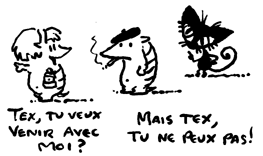 Vouloir, pouvoir and devoir are called modal verbs.
When used with infinitives, they act as auxiliary verbs or semi-auxiliaries.
Vouloir, pouvoir and devoir are called modal verbs.
When used with infinitives, they act as auxiliary verbs or semi-auxiliaries.

vouloir
Vouloir expresses a strong will or desire; in the present tense it has the same feeling as a command.
It is an irregular verb in the present tense.
Note how the present tense forms a "boot"; the stems (in this case the vowels) change only in the nous and vous forms.

 |
| vouloir 'to wish, want, will' |
| je veux |
nous voulons |
| tu veux |
vous voulez |
| il/elle/on veut |
ils/elles veulent |
| past participle: voulu |
|
Vouloir may be followed by an infinitive or a noun (Je veux du calme, I want some quiet.
Je veux dormir, I want to sleep).
This verb is also often paired with the adverb bien to express the meaning "to be willing"(Je veux bien! ).

pouvoir
Pouvoir expresses the physical ability or permission to do something ie possibility.
It is also an irregular verb with formation similar to vouloir. The "boot" formation is also evident.

 |
| pouvoir 'to be able, be permitted to' |
| je peux |
nous pouvons |
| tu peux |
vous pouvez |
| il/elle/on peut |
ils/elles peuvent |
| past participle: pu |
|
Pouvoir may be followed by an infinitive construction or may stand alone.

As in English, pouvoir is used to give or to ask permission translated by the English "may"
(Est-ce queje peux m'asseoir?, May I sit down?)

It is important not to confuse the roles of pouvoir and savoir in French.
Savoir expresses "to know how" whereas pouvoir expresses "to be able to."

devoir
Devoir expresses obligation, probability and supposition but if followed by a noun, expresses the idea "to owe".
This verb is irregular in its present form. Once again, the "boot" formation is seen with this verb;
the stem changes in the 1st and 2nd person plural conjugations.

 |
| devoir 'to have to, be supposed to/ to owe' |
| je dois |
nousdevons |
| tu dois |
vousdevez |
| il/elle/ondoit |
ils/ellesdoivent |
| past participle:dû |
|

Devoir may be followed by an infinitive or may stand alone to have the meaning "to have to"
(Je doispartir, I must leave.)
When followed by a noun, devoir means "to owe" (Je dois 10dollars).

All three verbs are often found in the conditional in order to be more polite in requests and commands.

 |
| Tammy: Je veux faire du shopping. Tex, tu veux venir avec moi? |
Tammy: I want to go shopping. Tex, do you want to come with me? |
| Bette: Mais Tex, tu ne peux pas. Tes étudiants doivent réviser pour l'examen de français. |
Bette: But Tex, you can't. Your students have to study for the French exam. |
| Tex: Oui, c'est vrai. Tammy, est-ce que tu peux m'aider? |
Tex: Yes, that's right. Tammy, can you help me? |
| Tammy: Mais Tex, je dois absolument acheter une nouvelle robe pour le week-end. |
Tammy: But Tex, I absolutely must buy a new dress for theweekend. |
| Bette: Vas-y Tammy. Tex et moi, nous pouvons aider les étudiants ensemble. |
Bette: Go ahead Tammy. Tex and I can help the students together! |
|


|